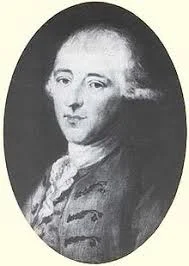John Kean used his accounting skills to help the Continental Army and, later, to assist in the creating of the National Government.
All tagged South Carolina
Thomas Bee Gets Published By The Enemy
Thomas Bee served as Lieutenant Governor of South Carolina during the Revolutionary War.
Ezekiel Polk Teaches A President Politics
Ezekiel Polk was an officer in the Continental Army and a pioneer of modern Tennessee.
John Lewis Gervais Suggests A Capital For South Carolina
John Lewis Gervais was a Continental Congressman from South Carolina.
Rawlins Lowndes Overrules The Stamp Act
Rawlins Lowndes was a Revolutionary Governor of South Carolina.
Thomas Pinckney Tickets John Adams
Thomas Pinckney was an extremely important Founder who spent time as a prisoner of war in the Revolution, became Governor of South Carolina and served as Minister to Great Britain.
John Laurens Joins Washington's Family
John Laurens was one of George Washington's aides-de-camp during the American Revolutionary War.
Francis Kinloch's Unheeded Advice
Francis Kinloch was a Continental Congressman and soldier in the Continental Army.
Pierce Butler Maintains The Resistance
Pierce Butler's major contribution to the Founding was his signing of the United States Constitution.
The Swamp Fox - Francis Marion's Alter Ego
Francis Marion earned the nickname the Swamp Fox from the British because he would attack them quickly and then vanish through the difficult terrain of southern swamps.
William Moultrie Inspires South Carolina's State Motto...And It's State Flag
William Moultrie gave South Carolina both its State Motto and State Flag.
Ralph Izard Journeys To Tuscany
Ralph Izard spent the first half of the American Revolution working on behalf of his country in foreign lands.
...And Richard Beresford Makes Nine
Richard Beresford is a little known Founder who played a small part in two important events.
Christopher Gadsden Designs The 'Don't Tread On Me' Flag
Christopher Gadsden may not be well known today, but the flag he designed is recognized by Americans across the United States.
The Two Sick Thomas Lynchs
Thomas Lynch and his son, Thomas Lynch Jr, were American Patriots whose story ended just when they were about to make history.
Nicholas Eveleigh - First Comptroller of the US Treasury
Nicholas Eveleigh is another Founder whose big contribution to the formation of the United States is overlooked because accounting and administration are not as sexy being a General or Diplomat.
William Henry Drayton and the Annexation of Georgia
William Henry Drayton was an American Revolutionary who, once he adopted the cause, was at the forefront of South Carolina rebel politics.
Henry Laurens
Laurens' contemporaries sent him to Philadelphia where he would spend a year as President of the Second Continental Congress. He was the presiding officer when the Articles of Confederation was signed.

















